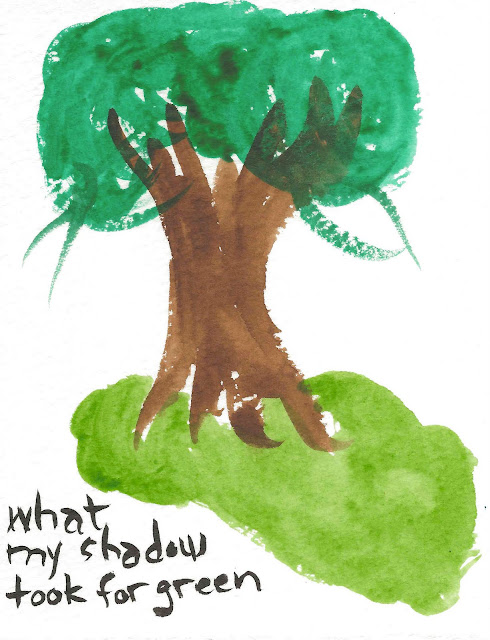4. These Woods, These Wooden
If in person is impossible,
we have to send words out
on their own. It is the only way,
it’s the way of writing,
and the direction of voice. I am
whistling now, but you can’t hear it
from wherever you are before
you realize I am telling you this.
There is music here
in The Nest, in Riverby,
John Burroughs’ version of wild
civilization. A little farther from
the road and this might be more than
a sliver of woods beside the Hudson.
Hardly matters, as we make
this percussive music in a room that
holds and deepens the dark of night.
Maybe there are no hemlocks
without this room, but the darkness of hemlocks
inhabits this space.
We come here
to make music because we are
half-tamed and we lack
a music that is a noise, that wanders,
that reminds us of water. What we make
slips between our fingers,
lingers only momentarily and disappears.
It seems to us that
what is most valuable is whatever
we cannot hold in place. The Hudson
flows south in darkness.
Riverby is the shadow across the river,
what holds the river back. It is a clutch of buildings
inside a stand of trees. This is where the humans live
down a steep incline and in the shadows, where
we try to disappear. Decay surrounds us. Decay
is the way of the forest, its deliberate urgency to dissolve into
soil, and this forest is occupied by buildings
of stone and wood and concrete
and collapsing slowly into themselves, the roof of one
opening into sky and trees out of it.
Nature doesn’t understand
the difference between nature and
anything else.
We live in
anything else, as anything else. We
are anything else, yet
there is no such thing.
My friends here are poets and artists,
creators. They do not try to live in the world.
They try to create it. We come here
to make music because we want to
disappear into the sound of water,
we want to return to the chaos.
We are sending messages out
into the world. And we send messages back and forth,
trading one message for another, telling our stories,
imagining the world forth. If you were here,
you would be a poet, you would be a musician,
you would be someone who could do
65 miles per hour in first gear,
you would be the king of Powerglide,
the tendency of everything
to fall apart, to return to formlessness,
and you would be the last
sound the forest made
before we ever woke.
Riverby sits on a running bed
of Esopus shale, layers of brittle grey
rock, breaking into grey rectangles
and ovals, wearing down into sand. We sit
upon the sloping face of the earth,
beneath a dark beadboard ceiling, sinking
into the left side of the river, every star
going dark, and the only voice
we hear is
our voices vibrating,
slowing down
back into silence.
we have to send words out
on their own. It is the only way,
it’s the way of writing,
and the direction of voice. I am
whistling now, but you can’t hear it
from wherever you are before
you realize I am telling you this.
There is music here
in The Nest, in Riverby,
John Burroughs’ version of wild
civilization. A little farther from
the road and this might be more than
a sliver of woods beside the Hudson.
Hardly matters, as we make
this percussive music in a room that
holds and deepens the dark of night.
Maybe there are no hemlocks
without this room, but the darkness of hemlocks
inhabits this space.
We come here
to make music because we are
half-tamed and we lack
a music that is a noise, that wanders,
that reminds us of water. What we make
slips between our fingers,
lingers only momentarily and disappears.
It seems to us that
what is most valuable is whatever
we cannot hold in place. The Hudson
flows south in darkness.
Riverby is the shadow across the river,
what holds the river back. It is a clutch of buildings
inside a stand of trees. This is where the humans live
down a steep incline and in the shadows, where
we try to disappear. Decay surrounds us. Decay
is the way of the forest, its deliberate urgency to dissolve into
soil, and this forest is occupied by buildings
of stone and wood and concrete
and collapsing slowly into themselves, the roof of one
opening into sky and trees out of it.
Nature doesn’t understand
the difference between nature and
anything else.
We live in
anything else, as anything else. We
are anything else, yet
there is no such thing.
My friends here are poets and artists,
creators. They do not try to live in the world.
They try to create it. We come here
to make music because we want to
disappear into the sound of water,
we want to return to the chaos.
We are sending messages out
into the world. And we send messages back and forth,
trading one message for another, telling our stories,
imagining the world forth. If you were here,
you would be a poet, you would be a musician,
you would be someone who could do
65 miles per hour in first gear,
you would be the king of Powerglide,
the tendency of everything
to fall apart, to return to formlessness,
and you would be the last
sound the forest made
before we ever woke.
Riverby sits on a running bed
of Esopus shale, layers of brittle grey
rock, breaking into grey rectangles
and ovals, wearing down into sand. We sit
upon the sloping face of the earth,
beneath a dark beadboard ceiling, sinking
into the left side of the river, every star
going dark, and the only voice
we hear is
our voices vibrating,
slowing down
back into silence.


Comments
Post a Comment